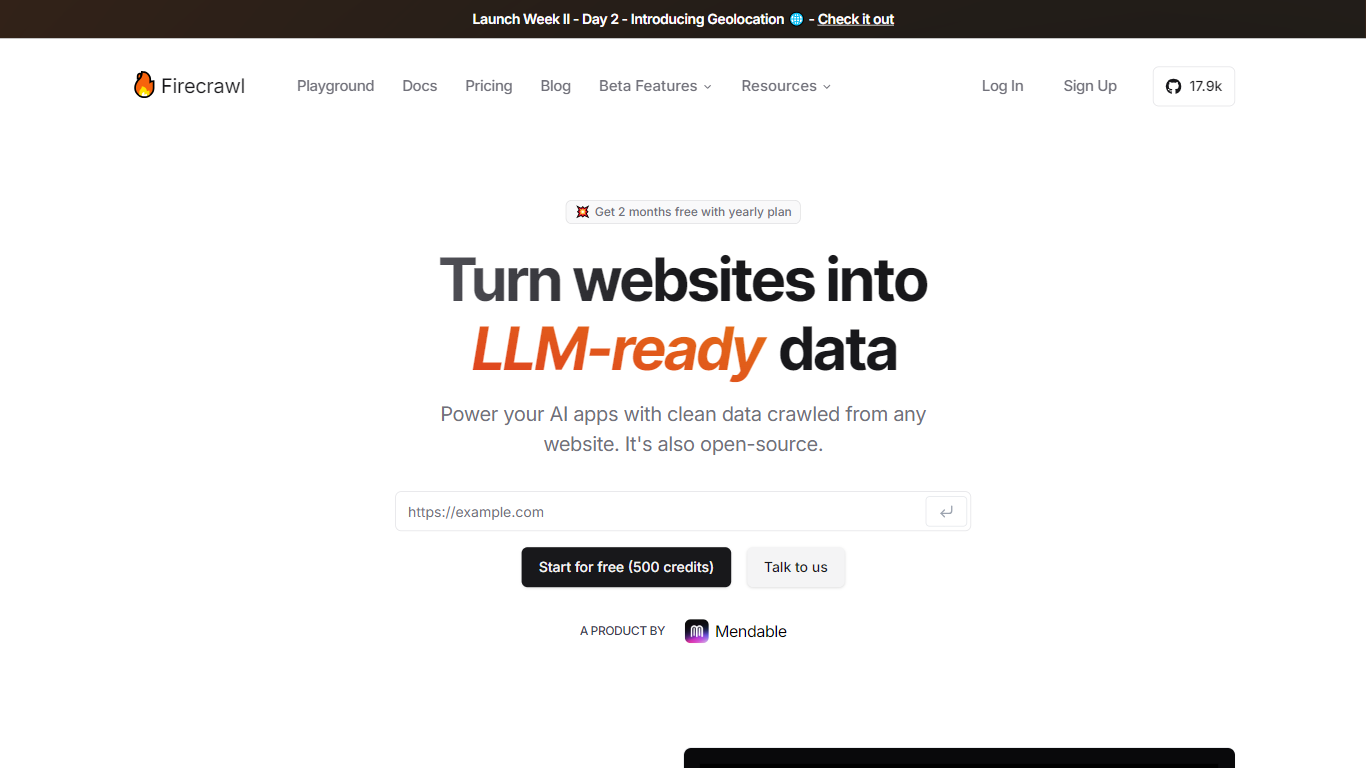Firecrawl
Firecrawl is an API service that transforms any website into clean, LLM-ready markdown or structured data formats. It automatically crawls all accessible subpages without needing sitemaps, handling JavaScript-rendered content and dynamic pages. This makes it ideal for AI developers, data scientists, and researchers who need organized web data for training models or building AI applications.
The platform supports multiple output formats including markdown, HTML, JSON with schema validation, screenshots, and metadata, enabling flexible use cases. Firecrawl also offers advanced features like web search with scraping, site mapping, and AI-powered data extraction from single or multiple pages.
Firecrawl manages common scraping challenges such as proxies, rate limits, captchas, and anti-bot measures, ensuring reliable and fast data retrieval. It allows users to interact with pages through actions like clicks, form inputs, and waits before scraping, which is useful for dynamic or protected content.
Developers can access Firecrawl via a hosted API or self-host the open-source backend. It provides SDKs for Python, Node.js, Go, and Rust, and integrates with popular LLM frameworks and low-code platforms, making it accessible for various technical skill levels.
Pricing is transparent and flexible, starting with a free plan offering 500 credits and scaling up to enterprise plans with unlimited credits and custom concurrency. Firecrawl is trusted by a growing community and backed by Y Combinator, emphasizing its reliability and ongoing development.
Overall, Firecrawl simplifies the process of turning complex web data into clean, structured formats ready for AI use, saving developers time and effort while supporting scalable, high-throughput projects.
🌐 Crawl entire websites automatically without sitemaps, capturing all accessible pages.
📄 Output data in multiple formats like markdown, JSON with schemas, HTML, screenshots, and metadata.
⚙️ Handle dynamic and JavaScript-rendered content with actions like clicks and form inputs before scraping.
🚀 Fast and reliable scraping with built-in proxy management, captcha handling, and rate limit bypass.
🔗 Integrate easily with popular SDKs, LLM frameworks, and low-code tools for flexible development.
Supports complex, dynamic websites including JavaScript content.
Multiple output formats tailored for AI and data projects.
Open-source backend option for self-hosting and customization.
Flexible pricing with a free tier and scalable enterprise plans.
Strong integration with popular AI and development frameworks.
Pricing credits system may require monitoring for high-volume users.
Some advanced features may require technical knowledge to implement.
Enterprise features require contacting sales, no public pricing.
Can I use Firecrawl without coding experience?
Yes, Firecrawl offers SDKs and integrations with low-code platforms like Zapier and Pabbly Connect, making it accessible to users with limited coding skills.
How does Firecrawl handle JavaScript-heavy websites?
Firecrawl can interact with dynamic content by performing actions such as clicks, form inputs, and waits before scraping, allowing it to extract data from JavaScript-rendered pages.
Are there limits on how many pages I can scrape?
Limits depend on your subscription plan, with free and paid tiers offering different credit amounts that correspond to the number of pages you can scrape.
Does Firecrawl support structured data extraction?
Yes, Firecrawl supports JSON mode with schema validation, enabling extraction of structured data from single pages or entire websites.
Can I self-host Firecrawl?
Yes, Firecrawl is open source and provides documentation for self-hosting the backend if you prefer to run it on your own infrastructure.
What kind of support is available?
Support levels vary by plan, ranging from basic support on hobby plans to priority support for growth and enterprise customers.
How does Firecrawl ensure reliable scraping?
Firecrawl manages proxies, captchas, rate limits, and anti-bot mechanisms to maintain reliable and fast data retrieval across websites.

